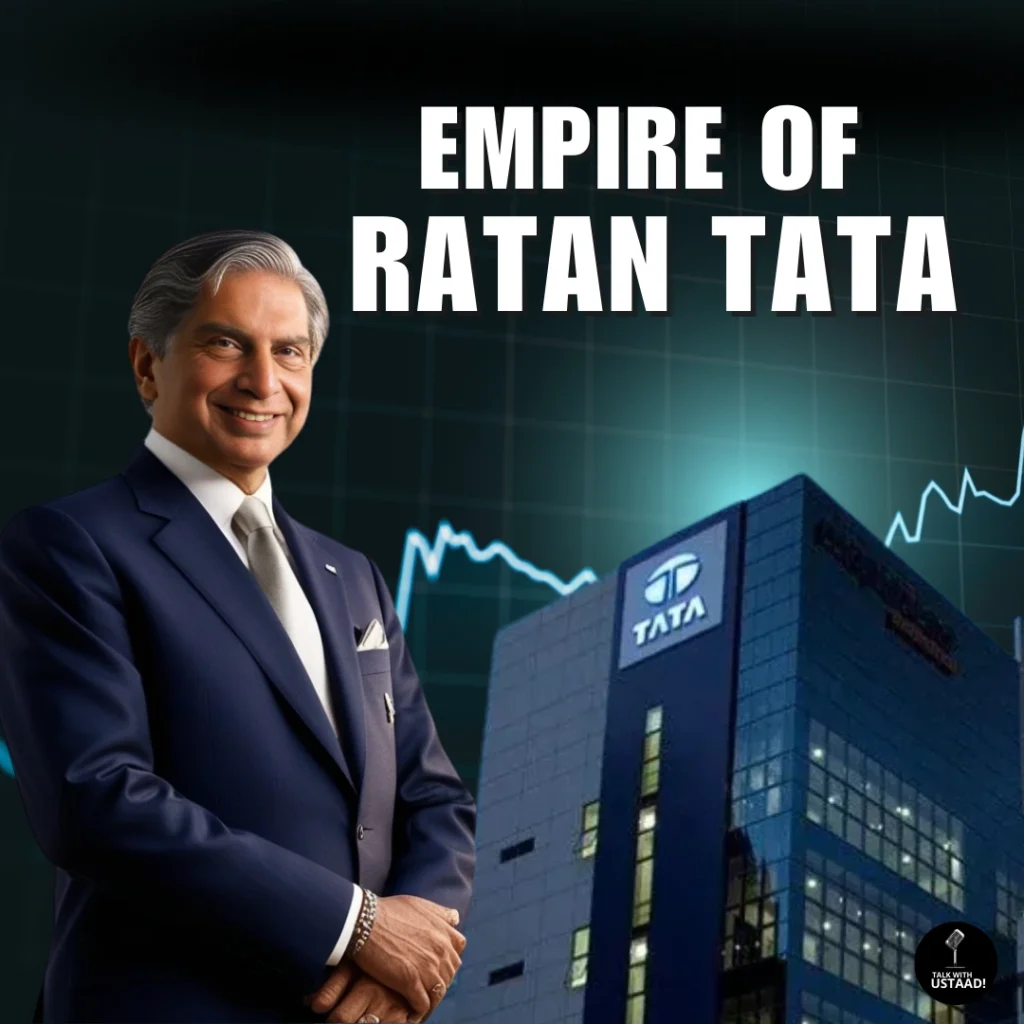Ratan Naval Tata, one of India’s most admired industrialists and philanthropists, is a name synonymous with resilience, vision, and leadership. As the Chairman Emeritus of Tata Sons, Ratan Tata’s journey epitomizes the transformative power of determination and an unwavering commitment to ethical values. He took the Tata Group, an Indian conglomerate, to global heights and contributed immensely to India’s economic growth. This blog covers the inspiring journey of Ratan Tata, from his early years to his remarkable achievements, and examines his legacy as a role model for aspiring entrepreneurs.

Early Life and Education
Ratan Tata was born on December 28, 1937, into the prominent Tata family, which had long been a force in Indian industry. Despite being born into wealth, Ratan Tata faced challenges early in life. His parents, Naval Tata and Sonoo Tata, separated when he was just ten years old, leaving him and his brother, Noel Tata, to be raised by their grandmother, Lady Navajbai Tata. This early personal adversity shaped his resilience and empathy, qualities he would later bring to his business and philanthropic endeavors.
He pursued his schooling in Mumbai before heading to the U.S. for higher studies. Ratan Tata studied architecture at Cornell University, graduating in 1962, and later attended the Advanced Management Program at Harvard Business School. His time abroad broadened his perspectives, shaping the global vision he would later bring to Tata Group.
Entry into Tata Group: Starting from the Ground Up
Unlike many successors in family businesses, Ratan Tata’s journey within the Tata Group was marked by humble beginnings. He started in 1962 with Tata Steel in Jamshedpur, working as a floor manager, shoveling limestone and handling various technical jobs. This hands-on experience provided him with a deep understanding of Tata Group’s operations and the issues facing the workers. Ratan Tata’s approach was unique in that he valued experience over title, taking the time to learn the company from the bottom up. His tenure at Tata Steel taught him invaluable lessons about leadership, empathy, and the importance of earning the trust of employees.
Becoming Chairman: The Start of a New Era
Ratan Tata became the Chairman of Tata Sons in 1991, succeeding his uncle, J.R.D. Tata. When he took over, Tata Group was a well-respected conglomerate but fragmented, with various companies operating independently under different management structures. Ratan Tata’s first major decision was to unify the group by consolidating the different entities under the Tata brand. He introduced a group-wide common code of conduct, which helped build a cohesive corporate culture focused on values like integrity and social responsibility.
This was not without resistance. Many senior executives were wary of change and preferred the autonomy they previously enjoyed. Ratan Tata, however, remained undeterred. His belief in a unified brand identity helped modernize the Tata Group and prepare it for global competition.
Bold Acquisitions and Global Expansion
Under Ratan Tata’s leadership, the Tata Group expanded its presence internationally through a series of bold acquisitions. His approach was groundbreaking for an Indian company, as he dared to take the Tata brand to the world stage. Some of the most notable acquisitions under his leadership included:
- Tetley Tea (2000): Tata’s acquisition of Tetley Tea was a defining moment, making Tata Tea the world’s second-largest tea company and marking the first major overseas acquisition by an Indian firm.
- Corus Group (2007): Tata Steel’s acquisition of Corus, a European steelmaker, was one of the largest Indian acquisitions abroad at the time. This move significantly enhanced Tata Steel’s production capacity and positioned it as a major player globally.
- Jaguar Land Rover (2008): One of Tata’s most ambitious acquisitions was the British luxury car brands Jaguar and Land Rover (JLR). Amid skepticism, Ratan Tata took a risk on the struggling brands, believing in their potential. Under Tata Motors’ ownership, JLR experienced a remarkable turnaround, becoming highly profitable and popular worldwide.
These acquisitions were instrumental in establishing Tata Group as a global brand. They not only expanded Tata’s reach but also marked India’s arrival on the global business stage. Ratan Tata’s vision and strategic approach allowed him to take calculated risks, creating value for the group and redefining India’s global business image.
The Birth of Tata Nano: Making Dreams Accessible
Ratan Tata’s most inspiring initiative was his ambition to create the world’s cheapest car. The idea for Tata Nano, a car priced at around ₹1 lakh (about $2,500 at the time), came from his empathy for the common Indian family who struggled with the inconvenience and dangers of traveling on scooters in crowded cities.
Introduced in 2009, Tata Nano became a symbol of affordable innovation. Although it faced production and marketing challenges, Nano demonstrated Tata’s commitment to solving real-world problems for the masses. Ratan Tata’s vision with Nano remains a testament to his innovative thinking and his drive to make an impact on society.
Philanthropy and Social Contributions
Ratan Tata’s commitment to society extends beyond business. The Tata family has a longstanding tradition of philanthropy, with two-thirds of the Tata Group’s ownership held by charitable trusts. Ratan Tata has made significant contributions to education, healthcare, and rural development in India. Through the Tata Trusts, he has supported institutions like Tata Memorial Hospital and the Indian Institute of Science.
Additionally, Ratan Tata has been a vocal supporter of technology and entrepreneurship. He has invested in several Indian startups, including Ola, Paytm, and Urban Ladder, supporting young entrepreneurs and promoting India’s technology sector.
Retirement and Continuing Influence
Ratan Tata retired as Chairman of Tata Sons in 2012, leaving behind a legacy of ethical leadership, innovation, and philanthropy. Even in retirement, he remains active, offering guidance to Tata Group’s next generation and staying involved with his philanthropic initiatives. His thoughtful insights on social media, especially on LinkedIn, where he shares his thoughts on various issues, have made him a source of inspiration for millions.
Lessons from Ratan Tata’s Life: Inspiring Today’s Youth
Ratan Tata’s story provides valuable lessons for today’s young entrepreneurs:
- Value-driven Leadership: Throughout his career, Ratan Tata adhered to a strict code of ethics. His success shows that value-driven leadership is essential for building a lasting legacy.
- Embrace Risks and Innovation: From acquiring global brands to launching the Tata Nano, Ratan Tata showed that calculated risks and innovation are key drivers of growth. His global acquisitions redefined India’s role in the global economy, and his commitment to innovation changed the way people perceived Indian products.
- Empathy and Social Responsibility: Ratan Tata’s commitment to society is as impressive as his business acumen. His philanthropic efforts highlight the importance of using success as a platform for positive change, a powerful message for today’s youth.
- Perseverance and Resilience: From facing opposition within the Tata Group to overcoming financial crises, Ratan Tata’s journey is a testament to perseverance. His resilience in times of adversity teaches aspiring entrepreneurs the importance of determination and staying true to one’s vision.
Conclusion: A Legacy that Endures
Ratan Tata’s journey from a young architect to one of India’s most respected industrialists is inspiring. He redefined the Tata Group, turning it into a global brand, and his philanthropic endeavors continue to make a difference in millions of lives. Ratan Tata’s life is a shining example of what can be achieved through hard work, empathy, and a vision that transcends personal gain.
For young entrepreneurs, Ratan Tata’s story offers a roadmap of ethical leadership, innovation, and social responsibility. His journey serves as a reminder that true success lies not only in business accomplishments but also in leaving a positive impact on society. Ratan Tata’s legacy continues to inspire India and the world, proving that success and kindness can indeed go hand in hand.









